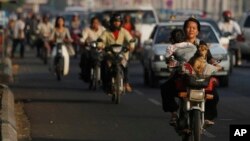A new traffic law will come into force on January 1 that is hoped to reduce the number of people killed on Cambodia’s roads each year.
Road accidents cost the economy an estimated $300 million annually, and the death toll from road accidents keeps rising. According to figures from the Ministry of Interior, some 2,265 people have died in traffic accidents already in 2015, an increase from 2,148 road deaths in 2014.
Government officials want to spread the word about the new law—signed by Prime Minister Hun Sen in July—which they hope will help to reduce traffic accidents. The law includes increased fines for those caught riding motorcycles without a helmet, as well as for car drivers found not using seat belts.
“We’ve been disseminating the information since it was passed,” said Interior Ministry spokesman Khieu Sopheak. “Since the law was announced to be implemented, we have disseminated information with cooperation from the local NGOs and development partners.”
He admitted, however, that the law alone would not be able to improve the road safety situation in the country. “It’s a bad habit, like smoking, so there will be some problems,” Sopheak said.
The law, containing 92 articles, says that motorcycles be ridden by up to two adults and one child, with all three riders required to wear a helmet.
Motorcycle drivers and passengers will have to pay a 15,000 riel ($3.70) fine if they are caught without a helmet, an increase from 3,000 riel under the old traffic law. Car drivers and passengers caught not wearing a seat belt must now pay 25,000 riel, up from 5,000 riel.
The law also says that those involved in some crashes are allowed to negotiate a settlement privately, without seeking intervention from the authorities. “If the accident results only in damage to property, the two parties may make their mutual settlement without any intervention from traffic police officers,” reads Article 36 of the law.
Kim Pagna, country director of Asia Injury Prevention Foundation, said that tackling the country’s dire road safety situation was hugely important, since traffic accidents kill more people in Cambodia than dengue fever, malaria and landmines combines.
But this horrendous record is avoidable, he said. “More than 70 percent of the people who died in traffic accidents were on motorbikes. More than 60 percent died because of head injuries,” Pagna said.
Asia Injury Prevention Foundation, a nongovernmental organization working to provide traffic safety knowledge and skills to lower- and middle-income countries, held a workshop for media last week in Sihanoukville to spread the message about using motorcycle helmets.
“According to research, if passengers wear standard quality helmets, it can decrease the risk by 42 percent,” Pagna said. “This means 42 people could survive out of 100 people.”








